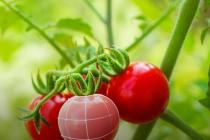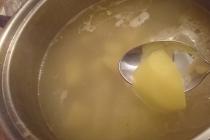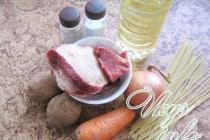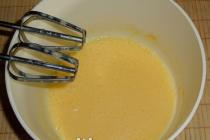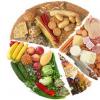We scatter the seeds on a flat surface and visually select the best ones. We remove all deformed, dark and empty seeds. This is especially true if we are going to sow seeds that we have grown ourselves. All seeds that are packaged in branded bags, especially seeds from large, reliable manufacturers, are calibrated before packaging.
It is often recommended to calibrate by placing the seeds in a 3% solution of table salt. To do this, dilute 3 grams of salt in 100 ml of water. Dip the seeds into the solution and mix. After 5-10 minutes, the floating seeds are thrown away, the rest are washed and dried.
IMPORTANT! This method is effective for fresh seeds that have been stored for no more than a year. Seeds that have been stored longer may all float. Because they are overdried. The seeds of peppers and eggplants are generally very light and will also float. Don't rush to throw them away. Just plant in a separate container.
Disinfection of seeds in a solution of potassium permanganate
This method will protect against infections on the surface of the seeds.
Prepare a 1% solution of potassium permanganate: dilute 1/3 teaspoon of potassium permanganate in 100 ml of water. Place the seeds in the solution for 20 minutes. Then we wash the seeds in clean water and dry them.
How else can you disinfect seeds?
To destroy the infection in the seed embryo, special chemicals are used. But they kill not only pathogenic microflora, but also beneficial microorganisms. For a more gentle and effective treatment, it is better to use biological products. For example: . We dilute the drug according to the attached instructions and soak the seeds for 1 hour. Then dry the seeds. After soaking in biological preparations, the seeds do not need to be washed.
Seeds can be disinfected by heating. This method is used on an industrial scale. The seeds are kept at a temperature of +40 0 C for 3 days, then for another day at a temperature of +80 0 C. At home, it is difficult to accurately maintain the temperature regime. And the warming up process itself is stressful for the embryo. It is better not to use it at home.
Soaking the seeds
 But anyone can soak the seeds before sowing. To increase germination energy, seeds are soaked in a solution of growth stimulants: epine, zircon, succinic acid, energen, sprout or humate +7. If the seeds are planted in poor soils, they can be soaked in a fertilizer solution: mortar, baby, fertik, agricola. For soaking we use one of the above preparations; they should not be mixed with each other.
But anyone can soak the seeds before sowing. To increase germination energy, seeds are soaked in a solution of growth stimulants: epine, zircon, succinic acid, energen, sprout or humate +7. If the seeds are planted in poor soils, they can be soaked in a fertilizer solution: mortar, baby, fertik, agricola. For soaking we use one of the above preparations; they should not be mixed with each other.
For each drug, prepare a solution according to the instructions. The soaking time is indicated there.
Barbating
Barbation is the saturation of seeds with oxygen. Seeds in a gauze bag are placed in a jar of water at room temperature, and air is supplied to it using an aquarium compressor. The seeds should be as close to the air bubbles as possible.
This method is effective for old seeds. Fresh seeds have no noticeable effect.
Hardening
Hardened seeds produce strong seedlings that tolerate cold soil well and do not get sick. We wrap the seeds in a damp cloth, place them in a plastic container, and put them in the refrigerator for two days. Seeds must be constantly moist.
The optimal temperature is +1…+2 0 C. Then we plant the seeds immediately, without drying, or soak them in a solution of stimulants, and then plant them.
Do I need to soak processed, encrusted, coated seeds?
 Large producers carry out pre-sowing treatment of seeds before selling them. They are disinfected and covered with a special colored shell made from a special solution that improves germination. Because of this, the seeds are colored.
Large producers carry out pre-sowing treatment of seeds before selling them. They are disinfected and covered with a special colored shell made from a special solution that improves germination. Because of this, the seeds are colored.
Such seeds do not need to be soaked or disinfected.
Many of us love to nibble on sunflower seeds in our spare time. But isn’t it harmful to eat seeds frequently? As children, our grandmothers and mothers scared us of appendicitis from frequent consumption of seeds..
What is the power of the plant
Seeds are the grains of a sunflower that ripen in its beautiful cap surrounded by sunny yellow petals. The homeland of this plant is America; they were brought to us in the mid-18th century, but the seeds became so integral to the life of Russians that they became a national feature.
Of course, everyone knows about sunflower and its seeds as a source of vegetable oil, but the seeds also have many other beneficial properties. The seeds contain a lot of calcium and magnesium, B vitamins and fat-soluble vitamins A, E and D, polyunsaturated fat acids that are beneficial for skin and hair.
Sunflower seeds are not only chewed, but also used in cooking and baking. The pressed cake remaining after squeezing the oil is used to feed livestock and feed fish in artificial reservoirs.
However, only dried and unprocessed grains, in which all the beneficial properties are concentrated, are beneficial. When peeling or roasting seeds, some of the beneficial properties are lost - they are destroyed when exposed to heat. vitamins and healthy fats spoil, and during cleaning, healthy fats are oxidized by air.
Obvious benefits for the body
Seeds are a valuable food product, rich in vegetable fat and, accordingly, fat-soluble vitamins, which every third resident of our country lacks. Therefore, the benefits of seeds are obvious: they are a source of vitamins that help in the fight against aging; seeds reduce plasma cholesterol levels.
Sunflower seeds can dull the appetite and in some cases diets for weight loss They are actively used as snacks. They provide essential fats and allow you to limit fats in your diet without compromising your health.
Seed kernels contain up to a quarter of the volume of dietary protein, which is quite suitable for the body's needs. There are even more fats and carbohydrates, and the presence of vitamins and minerals makes them a complete “dish”. There is a well-known fact from the story of a reclusive nun who lived on the island for many years and ate almost nothing but sunflower seeds.
Inside unroasted sunflower seeds, the microelements necessary for the body are perfectly preserved - iodine and iron, as well as magnesium, which is necessary for the stable functioning of the heart and cleansing the blood vessels of toxins. If you eat a handful of unroasted seeds once a week in winter, you will perfectly nourish your body with vitamins and minerals. Due to the content of vitamin B6 and folic acid , seeds are very useful for nervous diseases and mood disorders.
By the way, they are an excellent sedative and antidepressant. Therefore, if you have a nervous job, carry a bag of seeds with you. In addition, the process of eating seeds can replace smoking cigarettes – many people managed to get rid of their harmful addiction by switching to seeds.
Unroasted seeds are great for treating brittle nails and hair due to their unsaturated fatty acids. Extracts and particles of sunflower seeds are used in cosmetology - they are used in nourishing masks, scrubs and creams for the body and hair.
Negative effects of seeds
Harm and benefits of seeds
However, despite all the obvious benefits of seeds, they also have many negative aspects that are worth remembering and discussing in detail.
First of all, due to their rich composition, the seeds are quite high in calories: 100 grams of peeled seeds contain the same amount of calories as a whole bar of chocolate or a full meal - borscht and cutlet. Therefore, the intake of this product for those losing weight (unless provided for by a special diet) should be sharply limited or completely eliminated.
In addition, many people consume fried sunflower seeds, and when frying, most of the beneficial substances are lost, and healthy fats are transformed into harmful ones or destroyed.
Another nuisance can be that sunflower fields are often located near busy highways, which means that the plants can absorb toxic substances emissions, soils and fertilizers used to cultivate fields. When buying seeds, ask for a quality certificate, as for any food product, which the grandmothers who sell the seeds simply do not have.
In addition, many producers do not wash their seeds before roasting, nor do many consumers wash them before consuming them. And the peel of a sunflower can contain quite a lot of harmful substances and pathogens. There are cases of contracting unpleasant infections through seeds.
Dentists are also categorically against the consumption of sunflower seeds - with frequent consumption of sunflower seeds, tooth enamel deteriorates, which leads to damage to the front teeth. They crumble, are more susceptible to caries and darken. The teeth of sunflower seeds lovers are heavily damaged by tartar.
Seeds are contraindicated for singers and those who talk a lot and often. Due to the oils contained in sunflower seeds, the mucous membrane of the throat and vocal cords is lubricated with a thin layer of fatty film, after which it is very difficult to sing, as well as to talk a lot. The seeds make your mouth dry and thirsty.
The seeds are not recommended for patients with liver problems , stones in the gall bladder - they can cause an attack due to a sharp activation of the outflow of bile.
And another unpleasant thing about consuming seeds is that many do it on the street, throwing the husks at their feet, sitting on benches in parks and squares, or driving by in a car and throwing the husks out the window. As a result, mountains of husks form around the bench, mountains of garbage form along the roads, which, you see, is extremely unpleasant for those around you.
Do you like seeds?
Alena PARETSKAYA
Flour is a food product obtained by grinding the grains of various agricultural crops, mainly cereals. Flour can be made from varieties of cereal grains such as wheat, spelt, rye, buckwheat, oats, barley, millet, corn, rice and dagussa.
The earliest archaeological evidence of wheat seeds being crushed into dust between simple millstones to create flour dates back to 6000 BC.
For centuries, people, in the absence of medical drugs, have used natural gifts to maintain health and longevity. Traditional medicine recipes have reached us intact, and the latest research methods have made it possible to explain why this or that plant has “miraculous” properties.
It's the start of a new season for gardeners. And with it new worries, a different load on the joints and spine than in winter, more frequent contact with cold water, prolonged exposure to sunlight, bites of annoying mosquitoes and midges, cracked heels and calluses on the hands... How do you take care of your seedlings? plants, so we are ready to help you maintain and increase health, beauty and youth...
A persistent stereotype has formed that cannabis is something illegal. In no case! Hemp is a unique plant. I won’t go into details now, I’ll just say briefly that edible hemp is absolutely safe. The cannabinoid content is so low that you can safely use it at any age.
How do you choose seeds when it comes time to think about planting? We will not give advice about varieties and sellers. Let’s just say what we and our partners do: we collect them ourselves and form our own seed fund, exchange them with each other, and we highly recommend that you do the same. Everything presented on our website is grown in the subsidiary farms of summer residents and villagers, carefully collected and packaged by hand.
Can healthy things taste good, and can tasty things be healthy? You often hear phrases of this kind from sweet, charming customers: “I’ve been eating only healthy food lately, let’s go and eat something tasty, a little is okay.” As a rule, in such cases this means a cup of coffee with a cake in a nearby cafe.
There is a common belief that healthy eating is complicated and requires a lot of time, effort and money. As a rule, such beliefs are held by those who are not sufficiently familiar with the topic. Indeed, in the modern healthy food market there are many options for “fast food” - inexpensive and tasty products for quick preparation. The most striking example is eco-lunches and semi-finished products created in accordance with all the canons of proper nutrition. But what is it and what is it eaten with? We will talk about this and much more in this article.
If we look at history, it is believed that mustard was first used as a spice in the eastern part of China, from where it spread to India and further to Asian and European countries...
In Russia they love to chew seeds. Young and old alike are licking non-stop. Do you know what psychology scientists think about this habit? And practicing psychologists can draw conclusions about the state of a person who is addicted to this contagious pleasure that is difficult to stop. So, if you like to chew seeds, then read this article carefully.
Of course, from time to time, pure and high-quality roasted sunflower seeds are useful in all respects - a handful of tasty product contains a large amount of vitamins and minerals. Exfoliating the skin with your hands allows you to calm down - it's akin to meditation. But in everything there is a good middle ground and listen to yourself if a bag of seeds in a store window has become desirable for you.
Attention - the habit of gnawing seeds is not so harmless - it speaks of hidden aggression. And in psychology there is a whole section devoted to the connection between the desire to consume a certain product and the state of the psyche. After all, what food we choose in most cases reflects our inner state. Scientists, studying people with a craving for seeds, came to conclusions about the psychological problems of “rodents” - hidden aggression and a lack of sincere emotions towards the people around them. Moreover, outwardly these can be nice and kind people who carefully hide a lot of discontent towards the world. But what about those around you - even the seed lovers themselves are not aware of such problems in themselves.
Why does a person gnaw seeds to suppress anger, to get rid of this oppressive emotion? After all, before swallowing a sunflower nut, you need to remove the husk and then grind the seed - such a small act of releasing aggression from a psychological point of view. The seeds attract people with walled-up reserves of aggression like a drug. And try at this moment to prevent them from doing this activity - start talking about the harmfulness of the habit for teeth or bad manners, take away the seeds - this is how withdrawal will begin! And the hatred of the lover of peeling will manifest itself by coming out. Seed rodents seem to have genies inside them - only this is not a good wish-fulfiller, but a concentration of evil and negativity. God forbid you get caught by such lovers of peeling - they can crush everything and everyone in their path. But take a closer look at this seemingly good-natured person sitting on a park bench with a bag of seeds - is he the most harmless and peaceful person in your environment at the moment?
What if, in a firm memory and with a clear consciousness, you suddenly want to gnaw on the seeds, first think - maybe you are dissatisfied and indignant with something? A cold shower, a light jog, or breaking dishes will give an outlet to the sudden negativity. After all, you can’t accumulate negative emotions in yourself - sooner or later they will turn into illness.
In Russia they love to chew seeds. Young and old alike are licking non-stop. Do you know what psychology scientists think about this habit? And practicing psychologists can draw conclusions about the state of a person who is addicted to this contagious pleasure that is difficult to stop. So, if you like to chew seeds, then...
mail@siteAdministrator Pages about healthy living9 healthiest seeds and grains
The seeds are very healthy and nutritious. We are mainly attracted to larger seeds and grains, such as nuts or legumes. Of the small ones, our most popular ones are, of course, sunflower seeds. But what do we know about the rest? And what is the best way to use them to get the maximum amount of nutrients for our body.
How to best consume seeds and grains
The best way to get the most from the seeds is to consume them raw. Heat treatment leads to the formation of toxins, and vitamins, minerals and essential oils are denatured. Roasted seeds are no longer living food. No seeds in the world can withstand heat and frying without retaining their nutritional properties. It is always worth remembering that seeds should be eaten in their natural state - raw. They can be soaked, ground and crushed, especially if the seed coat is too hard for teeth.
- Choose raw and unsalted seeds.
- Avoid roasted or glazed seeds.
- Less sweeteners.
Let's look at which seeds are considered the most useful and are available with us.
1. Hemp seeds
More and more people are discovering the nutritional benefits of hemp seeds and oil. Hemp contains:
All twenty amino acids, including nine essential amino acids, that is, those that the human body does not produce
- a large number of simple proteins that increase immunity and resistance to toxins. Eating hemp seeds helps (if not cures) people suffering from diseases associated with immunodeficiency. The conclusion is supported by the fact that they were used to treat nutritional deficiencies caused by tuberculosis
- the highest concentration of essential fatty acids in the plant world, exceeding that of any nuts or seeds, including flax seeds
- ideal ratio of omega-6 and omega-3 linolenic acid - invaluable for the health of the cardiovascular and immune systems of the human body
Hemp seeds– one of the best sources of easily digestible vegetable protein. They also contain a lot of phytonutrients that support the normal condition of tissues, blood vessels, skin cells, organs and mitochondria. And finally, it is the richest source of polyunsaturated essential fatty acids.
The best way to provide the body with enough amino acid material to produce globulin is to eat foods rich in globulin proteins. Since 65% of the protein in hemp seeds is globulin, and in addition there is a certain amount of albumin, this protein is ideal for humans, since its shape is the same as blood plasma protein. Thus, consuming hemp seeds provides the body with all the necessary amino acids to maintain health, improve immunity and protect against many dangerous diseases associated with immunodeficiency.
2. Pomegranate seeds
Pomegranate seeds are an excellent source of antioxidants, so they help protect our body from the harmful effects of free radicals that cause premature aging.
Simply put, juice from pomegranate seeds increases the level of oxygen in a person's blood. Antioxidants counteract free radicals and prevent the formation of blood clots in blood vessels. This allows you to maintain free blood circulation and ensure normal access of oxygen to tissue cells.
Pomegranates are incredibly rich in polyphenols (a special form of antioxidants), which reduce the risk of cancer and heart failure. In fact, pomegranate juice, which contains tannins, anthocyanins and ellagic acid, has even higher antioxidant activity than green tea and red wine.
Pomegranates, thanks to the edible seeds enclosed in juicy “sacs”, have large reserves of vitamin C and potassium (it should be noted that they are low in calories), and are also a good source of dietary fiber.
The antioxidant properties of pomegranates prevent the oxidation of low-sensitivity lipoprotein cholesterol. This essentially means protecting against thickening of blood vessel walls due to excess fat, which leads to poor circulation and blood clots.
“In experimental mice given pomegranate juice, the development of atherosclerosis was significantly (by at least 30 percent) slowed down,” says Claudio Napoli, professor of medicine and clinical pathology at the University of Naples.
The beneficial properties of pomegranate are not limited to those listed above. It promotes the restoration of arthritic cartilage, has the ability to alleviate inflammatory processes and counteract enzymes that destroy cartilage tissue.
3. Flax seeds
The dietary fiber contained in flax seeds reduces sharp fluctuations in blood lipid levels after meals and thus regulates our appetite. Scientists from the University of Copenhagen have obtained experimental data on the ability of flax seeds to suppress appetite and help reduce excess weight.
Flax has been grown for centuries and is known for its unsurpassed qualities throughout the world. Hippocrates also wrote about the use of flax to relieve stomach pain, and the French emperor Charlemagne loved this plant so much that he even passed a law requiring its use.
The main beneficial properties of flax seeds are their high content of alpha-linolenic acid, dietary fiber and lingans. One of the essential fatty acids, alpha-linolenic acid prevents the formation of substances that provoke inflammatory processes and also reduces the level of reactive C protein in the blood. Thanks to the action of alpha-linolenic acid and lingans, flax blocks the development of tumors in animals and can help reduce the risk of cancer in humans.
Lingans– these are plant estrogens, elements of plant tissue that have an estrogenic effect and antioxidant properties. They help stabilize hormonal balance, relieve symptoms of PMS and menopause, and can potentially reduce the risk of breast and prostate cancer.
The fiber in flax seeds promotes healthy digestion. One tablespoon of whole seeds contains as much fiber as half a cup of oat bran. The soluble fiber in flax may reduce the risk of heart attack.
Ground flax seeds are even more beneficial than whole flax seeds. They can be ground in a coffee grinder or blender and then added to cereal, baked goods or smoothies. And regular consumption of oil or flaxseed decoction is a great help for stomach diseases.

4. Pumpkin seeds
They are the only seeds that help create an alkaline environment. Pumpkin seeds are characterized by a high protein content. 100 grams of these seeds, when taken daily, provide 54 percent of a person's protein needs.
Most of us take pills to replenish the deficiency of B vitamins, while pumpkin seeds are much more effective in this regard. They are rich in thiamine, riboflavin, niacinamide, pantothenic acid, vitamin B-6 and folate.
For those who tend to feel down, pumpkin seeds are especially beneficial because they help fight depression thanks to L-tryptophan, a chemical compound that boosts our mood.
They can also prevent the formation of certain types of kidney stones by preventing the buildup of calcium oxalate.
5. Apricot seeds
Apricot kernels, like most seeds, are very nutritious. Among the beneficial substances they contain is amygdalin, also known as vitamin B-17. It kills cancer cells and thus prevents the development of cancer.
There are a great many foods rich in amygdalin, but most of them have practically disappeared from the daily diet of residents of civilized countries. People all over the world who still adhere to traditional cuisine are much less likely to get cancer, since national dishes include foods containing amygdalin.
In addition to apricot kernels, bitter almonds are rich in amygdalin (amygdalin has a bitter taste, so sweet almonds do not contain this substance, as do sweet apricot kernels). Amygdalin is also present in apple seeds, grape seeds, millet seeds, green beans, most berries, cassava and many other seeds and grains, with the exception of hybrids.
In order to prevent cancer, biochemist Ernst T. Krebs, who first isolated amygdalin in concentrated form back in the 50s of the last century, recommended using amygdalin. He states that a person who eats ten to twelve apricot kernels a day throughout his life is likely to be protected from cancer.
6. Sesame seeds
Sesame seeds are probably the oldest spice known to man. They were especially highly valued for their exceptional ability to maintain freshness and resistance to rancidity.
They are an excellent source of magnesium and copper, as well as calcium, iron, phosphorus, vitamin B1, zinc and dietary fiber. In addition to these essential nutrients, sesame seeds contain two unique ingredients: sesamin and sesamolin. Both of these compounds belong to a group of nutritional fibers called lingans. They have the ability to reduce cholesterol levels in human blood, prevent high blood pressure and increase the supply of vitamin E in animals. Sesamin is also known to protect the liver from oxidative damage.
7. Sunflower seeds
Sunflower seeds are an exceptional source of vitamin E, the main fat-soluble antioxidant in the human body. Vitamin E travels throughout the body, neutralizing the effects of free radicals that can cause damage to fat-containing structures and molecules such as cell membranes, brain tissue and cholesterol.
Sunflower seeds are high in phytosterols. These are chemical compounds of plant origin, similar in structure to cholesterol. When consumed regularly in sufficient quantities, you can reduce cholesterol levels, improve the immune response and reduce the risk of certain cancers.
As already mentioned, sunflower seeds have an extremely high concentration of magnesium. Numerous studies support magnesium's ability to positively influence asthma symptoms, lower blood pressure and prevent migraine headaches, and reduce the risk of heart attack.
8. Cumin seeds
Humanity has known about the beneficial properties of cumin seeds since antiquity. This traditional seasoning has been renowned for its medicinal properties for centuries.
Cumin (or cumin) is useful for digestive tract disorders and is also a good antiseptic. The seeds are rich in iron and help maintain normal liver function.
In addition, cumin helps get rid of the symptoms of common. For sore throat, you can make a decoction of them, add a little dried ginger and take this drink to relieve discomfort.
Cumin juice can serve as an excellent tonic for the whole body in the absence of any specific diseases. It is believed that it is able to speed up general metabolic processes in the body, making metabolism more efficient.
Cumin is a powerful tool for activating the functions of the liver and kidneys, allowing you to strengthen the functioning of the immune system. Black cumin seeds have long been used to treat asthma and arthritis.
9. Grape seeds
Grape seeds are high in vitamin E, flavonoids, linoleic acid and polyphenols. Grape seed extract can prevent heart disease, sudden fluctuations in blood pressure and increased cholesterol. By limiting the processes of lipid oxidation, the phenolic resins contained in them enhance platelet aggregation and help stop inflammatory processes.
According to data published in the journal Carcinogenesis, grape seed extract kills squamous cells of cancerous tumors, leaving healthy cells undamaged. And most recently, in the journal Applied and Environmental Microbiology, data appeared on the effectiveness of its use in reducing the infectivity of the recently discovered stomach flu virus and its modifications.
What seeds do you use in your diet?
Play sports, stick to proper nutrition and!




